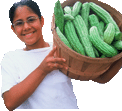Back to the Guide to Farming Table of Contents >>
Basic Standards for Home and Commercial Kitchens, and Small Scale Food Processing Facilities
Information prepared by Olga Padilla-Zakour, from the NYS Food Venture Center at Cornell University (www.nysaes.cornell.edu/necfe) for educational purposes only – please contact pertinent regulatory agencies for further detail.
The Federal government, individual states, cities and municipalities govern the operation of food processing facilities whether home kitchens or commercial facilities. Regulations differ from state to state and are determined by the type of the food product being prepared and the processing methods used. When considering starting up a home or commercial kitchen, it is important to research which agencies regulate licensing of the product, inspection of the facility, foods allowed and not allowed to be produced in each facility, local zoning laws governing the use of the building, and building codes.
Foods that are regulated and require a Processing License – Article 20-C License
This regulation applies to anything that is altered by baking, canning, preserving, freezing, dehydrating, juicing, cider, pickling, brining, bottling, packaging, repackaging, pressing, waxing, heating or cooking, smoking, roasting, manufacturing. Requirements vary depending on product. A scheduled process must be developed which outlines recipe testing/formulation, critical control points (to avoid contamination), processing steps, storage requirements, distribution and selling conditions/restrictions. Assistance for developing a scheduled process is available from the NYS Food Venture Center – see information below. For a complete list of products that require an Article 20-C license visit the following website: www.agmkt.state.ny.us/FS/general/license.html or call 518-457-4492.
Food Safety
HACCP (Hazard Analysis Critical Control Point) is a FDA regulation that requires a controlled process be followed to minimize points of contamination when processing foods. HACCP plans are required for wholesale sales (not for retail) of seafood, dairy, juice and cider processing facilities. Other sectors of the food industry are coming into voluntary compliance. For more information check the website – www.fda.gov/Food/FoodSafety/HazardAnalysisCriticalControlPointsHACCP/default.htm
Home Processing Exemption
New York State allows non-hazardous foods such as candy, cakes not requiring refrigeration, cookies, brownies, two-crusted fruit pies, breads and rolls, fruit jams and jellies, dried spices and herbs, and snack items to be produced in home kitchens. A review of processing procedures may be required for certain products before exemption is granted. Anyone seeking a Home Processing Exemption must contact the NYS Department of Agriculture & Markets to obtain this certificate here: www.agmkt.state.ny.us/FS/consumer/processor.html An annual water test for bacteria is required for all home processors on private water supplies. Internet sales are not allowed under this exemption. Internet sales are not allowed under this exemption.
Some types of foods may not be produced in a home kitchen, as mandated by Federal regulations. These foods are considered potentially hazardous:
- Low acid and acidified foods packed in hermetically sealed containers must be registered with the US Food and Drug Administration (FDA).
- Meat products with more than 3% raw or 2% cooked meat ingredients in a completed product are regulated by the US Department of Agriculture (USDA).
- Vacuum packaged and any other reduced oxygen packaged products.
Zoning Regulations
Local municipal zoning and planning boards determine the scale of operations permitted in an establishment. They regulate number of employees allowed on premise and whether a second separate kitchen facility is allowed to operate on site. Check with local building inspectors to determine what operations can take place in the kitchen chosen for food production. There are local building codes that govern volume of business in a building and egress from building, drainage issues such as back flow protection and grease traps. Commercial equipment must comply with fire codes, FDA and USDA requirements as appropriate.
Minimum Food Processing Facility Requirements for New York State
| Procedure |
Home Kitchen |
Home Annex |
Commercial |
| Inspection |
Yes, Potable water required (documented) – municipal or treated well water |
Yes, Potable water required (documented) – municipal or treated well water |
Yes, Potable water required (documented) – municipal or treated well water |
| Licensing |
Non-potentially hazardous foods for wholesale market exempt from licensing by NYS Dept of Agriculture & Markets (NYSDAM) |
20-C license
NYS Dept. of Agriculture &Markets
Separate cleaning, sanitizing, and hand wash facilities.
Fee: $400.00/2 years |
20-C license
NYSDAM
Fee – $400.00/2 years |
| Inspection Agency |
NYSDAM
May request review of processing procedures by recognized processing authority. Only normal kitchen facilities can be used. |
NYSDAM
Dept. of Health- fresh-serve foods only. Kitchen held to restaurant standards (see below). |
NYSDAM
Dept. of Health- fresh-serve foods only. Kitchen held to restaurant standards (see below). |
| Foods Allowed |
• Candy- non-chocolate, fudge
• Cakes not requiring refrigeration
• Cookies
• Brownies
• Two-crust fruit pies
• Bread, rolls
• Fruit jams, jellies
• Spices, herbs
• Snack items
• Baked goods (i.e. bread, rolls) for wholesale distribution |
Any processed food
Low acid and acidified foods packed in hermetically sealed containers. Must register and file with FDA |
Any processed food
Low acid and acidified foods packed in hermetically sealed containers. Must register and file with FDA |
| Foods Not Allowed |
• Cakes which require refrigeration
• Pies containing milk, eggs or meat products
• Chocolates
• Low acid / acidified foods |
Meat products – if more than 3% raw or 2% cookedmeat ingredients – USDA regulated |
Meat products if more than 3% raw or 2% cooked meat ingredients – USDA regulated |
| Zoning |
• Check with city/town Zoning /Planning Board
• Issues: Scale of operation, number of employees |
• Check with municipality Zoning/Planning Board
• 2nd kitchen may not be allowed on premise
• Issues: scale of operation; number of employees |
- Check with municipality Zoning/Planning Board
- Issues: scale of operation, number of employees
|
Basic Requirements for a Small-Scale Food Processing Establishment
State of NY Department of Health (DOH) – Restaurants
• Submit kitchen drawings before construction
• Three-bay sink with stainless steel drain boards or two-bay sink with a commercial dishwasher
• Separate hand washing/mop sink
• Washable materials on walls and work surfaces
• Restaurant grade, commercial tile floors- painted concrete not allowed
• Commercial coolers/refrigeration
• Water from non-municipal water supply must be tested quarterly.
• Review DOH “Checklist for New or Remodeled Establishments”
• Some locales require food worker certification.
NYS Department of Agriculture and Markets – Food preparation and processing
• Kitchen requirements based on food item(s) being produced- Determined upon inspection
• Easily cleanable, smooth work surfaces.
• Non-absorbent, smooth and easily cleanable floors, walls and ceilings.
• Review of processing procedures including hand washing, sanitizing, equipment sinks, water potability and food preparation.
• Review NYSDAM Circular 951 -Pursuant to the Licensing of Food Processing Establishments.*
• Circular 938 – Rules and Regulations Relating to Food Processing Establishments.*
• Circular 933-Good Manufacturing Practices
*Circulars are available through local Dept. of Agriculture and Markets or NYSDAM, 10B Airline Drive Albany, NY 12235, Phone 518-457-3880 0r 1-800-554-4501
Helpful Resources for Small Scale Food Processors
For assistance in developing a scheduled process for your recipe, developing a processed food product, and labeling, contact: NY Food Venture Center at the NYS Agricultural Experiment Station in Geneva, 315-787-2259.
Request the publication: Small Scale Food Entrepreneurship: A Technical Guide for Food Ventures from Elizabeth Keller, 315-655-8831 or esk15@cornell.edu
Product development, processing and distribution assistance is also available from Nelson Farms at SUNY Morrisville – 315-655-8831 or www.nelsonfarms.org
The USDA Sustainable Agriculture Research and Education (SARE) agency has published a plain-language guide to Value-Added Food Processing that is available online in PDF format at nesfp.nutrition.tufts.edu/downloads/guides/PL_ValueAddedGuide.pdf
To learn about small scale food processing activities in NYS, join the NYS Small Scale Food Processors Association: www.nyssfpa.com and become a member of Pride of NY – 800-554-4501 or email:
; www.prideofny.com
Regional Offices of the NYS Department of Agriculture and Markets
NYS Department of Agriculture and Markets
Division of Food and Inspection Services
55 Hanson Place
Brooklyn, NY 11217-1583
212-722-2876
NYS Department of Agriculture and Markets
Division of Food and Inspection Services
Electric Tower Building
535 Washington Place Washington Street, 2nd Floor Suite 203
Buffalo, NY 14203
716-847-3185
NYS Department of Agriculture and Markets
Division of Food and Inspection Services
900 Jefferson Road
Rochester, NY 14623
585-487-0200
NYS Department of Agriculture and Markets
Division of Food and Inspection Services
NYS Fairgrounds – Art and Home Center
Syracuse, NY 13209
315-487-0852
United States Food and Drug Administration
300 Pearl Street, Suite 100
Buffalo, NY 14202
716-551-4478
New York District Office
158-15 Liberty Avenue
Jamaica, NY 11433
718-662-5447
United States Department of Agriculture – Food Safety Inspection Service (USDA FSIS)
5 Washington Square
Albany, NY 12205
518-457-4492
This fact sheet is part of the Guide to Farming in NY by Monika Roth et al, published by the Cornell Small Farms Program and Cornell Cooperative Extension. Fact sheets are updated once annually, so information may have changed since last revision. If you are reading a printed version of a fact sheet, compare revision date with online fact sheet publish dates at https://nebeginningfarmers.org/publications/farming-guide to make sure you have the latest version.

 Information for beginning farmers.
Information for beginning farmers.
